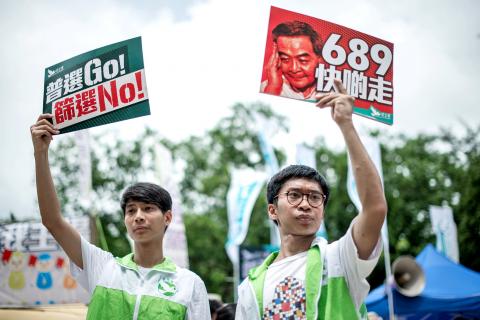Closer cooperation between anti-China activists in Hong Kong and Taiwan is causing “irritation, suspicion and perhaps a bit of paranoia” in Beijing, an article in Foreign Policy magazine’s online edition says.
Pro-democracy activists in both places have concluded only recently that they are facing similar threats from China, says the article posted on Tuesday by Grace Tsoi, a Hong Kong journalist now based in Taipei.
“Hong Kong offers a sobering lesson for Taiwan on the potential dangers of further integration with China,” Tsoi writes.

Photo: AFP
Since Hong Kong was returned from British rule to Chinese sovereignty in 1997, Beijing has asserted informal control through “quiet contacts” with legislators, government administrators and business leaders, she says.
Some Hong Kong business magnates and their children have been appointed members of the Chinese People’s Political Consultative Conference — “an honorary title without real political power, but nevertheless one that smoothes business transactions on the mainland,” she writes.
The Chinese Communist Party has successfully leveraged economic ties with both Hong Kong and Taiwan, but as the “shadow of Beijing grows” more people are “turning their heads, and hearts, away from the mainland,” Tsoi writes.
Hong Kong University of Science and Technology associate professor Sing Ming (成名) is quoted in the article as saying: “As Hong Kong faces increased suppression, it can remind Taiwanese to raise their guard. The growing distance between China and the Taiwanese, in turn, increases the bargaining power of Hong Kong.”
Cooperation between independence movements in Taiwan and Hong Kong could encourage separatists across China to follow suit, “thus threatening to turn the party’s worst nightmare — China’s disintegration — into reality,” Tsoi says.
The Wall Street Journal on Wednesday reported that China was expected to announce on Aug. 31 its decision on how Hong Kong’s leader will be elected.
“At issue is whether Beijing will let Hong Kong residents directly nominate candidates for the chief executive post or whether only pre-approved candidates will be allowed to run,” the newspaper said.
“So far, rhetoric from officials in both Beijing and Hong Kong suggests that Beijing will reject outright activists’ demands,” it added.

CHAOS: Iranians took to the streets playing celebratory music after reports of Khamenei’s death on Saturday, while mourners also gathered in Tehran yesterday Iranian Supreme Leader Ayatollah Ali Khamenei was killed in a major attack on Iran launched by Israel and the US, throwing the future of the Islamic republic into doubt and raising the risk of regional instability. Iranian state television and the state-run IRNA news agency announced the 86-year-old’s death early yesterday. US President Donald Trump said it gave Iranians their “greatest chance” to “take back” their country. The announcements came after a joint US and Israeli aerial bombardment that targeted Iranian military and governmental sites. Trump said the “heavy and pinpoint bombing” would continue through the week or as long

TRUST: The KMT said it respected the US’ timing and considerations, and hoped it would continue to honor its commitments to helping Taiwan bolster its defenses and deterrence US President Donald Trump is delaying a multibillion-dollar arms sale to Taiwan to ensure his visit to Beijing is successful, a New York Times report said. The weapons sales package has stalled in the US Department of State, the report said, citing US officials it did not identify. The White House has told agencies not to push forward ahead of Trump’s meeting with Chinese President Xi Jinping (習近平), it said. The two last month held a phone call to discuss trade and geopolitical flashpoints ahead of the summit. Xi raised the Taiwan issue and urged the US to handle arms sales to

State-run CPC Corp, Taiwan (CPC, 台灣中油) yesterday said that it had confirmed on Saturday night with its liquefied natural gas (LNG) and crude oil suppliers that shipments are proceeding as scheduled and that domestic supplies remain unaffected. The CPC yesterday announced the gasoline and diesel prices will rise by NT$0.2 and NT$0.4 per liter, respectively, starting Monday, citing Middle East tensions and blizzards in the eastern United States. CPC also iterated it has been reducing the proportion of crude oil imports from the Middle East and diversifying its supply sources in the past few years in response to geopolitical risks, expanding

Pro-democracy media tycoon Jimmy Lai’s (黎智英) fraud conviction and prison sentence were yesterday overturned by a Hong Kong court, in a surprise legal decision that comes soon after Lai was jailed for 20 years on a separate national security charge. Judges Jeremy Poon (潘兆初), Anthea Pang (彭寶琴) and Derek Pang (彭偉昌) said in the judgement that they allowed the appeal from Lai, and another defendant in the case, to proceed, as a lower court judge had “erred.” “The Court of Appeal gave them leave to appeal against their conviction, allowed their appeals, quashed the convictions and set aside the sentences,” the judges